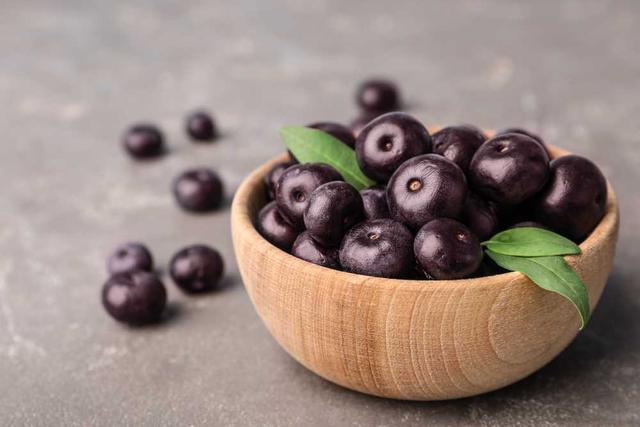
Curious about the taste of acai? Discover the delightful flavor of this superfood berry! Known for its unique blend of rich dark chocolate and tangy berry notes, acai offers a refreshing and slightly sweet taste. Whether enjoyed in smoothies, bowls, or as an ingredient in various dishes, explore the irresistible and exotic flavor profile of acai today!
Exploring the Unique Flavor Profile of Acai: What Does it Taste Like?

Exploring the Unique Flavor Profile of Acai: What Does it Taste Like?
Acai berries have a unique taste that sets them apart from other berries. While most berries taste sweet when ripe, acai berries have an earthy, bitter taste with hints of dark chocolate and blackberry. However, when consumed in the United States, where fresh acai berries are not readily available, the taste is often described as a refreshing mixture of fruity sweetness and tartness. This is because most acai products in the US, such as frozen purées and fresh-pressed juices, have added sweeteners and extra ingredients to enhance the pleasant notes of the berry.
The flavor profile of acai is similar to other pitted fruits like apricots, peaches, and dates. However, it differs from most familiar fruits in terms of its unique taste. Acai berries grow from trees called acai palms, making them similar to other palm tree fruits like coconuts and bananas. The tropical and sweet flavor of acai pairs well with other tropical tastes like pineapple, coconut, and mango.
In conclusion, acai has an earthy, bitter taste with hints of dark chocolate and blackberry when consumed in its natural state. However, when consumed in the US through acai-based products, it has a refreshing mixture of fruity sweetness and tartness due to added sweeteners. Its flavor profile is similar to other pitted fruits but distinct from most familiar fruits. The tropical and sweet taste of acai makes it an excellent addition to dishes or beverages with tropical flavors like pineapple, coconut, and mango.
Unveiling the Taste of Acai: A Sweet and Tangy Delight
Acai berries have a unique taste that sets them apart from other fruits. While most berries taste sweet when ripe, acai berries have an earthy, bitter taste with hints of dark chocolate and blackberry. However, when consumed in the United States, acai is typically enjoyed as a refreshing mixture of fruity sweetness and tartness. This is because most acai products in the US, such as frozen purée and fresh-pressed juice, have added sweeteners and extra ingredients to enhance the pleasant notes of the berry.
The flavor profile of acai is often compared to other pitted fruits like apricots, peaches, and dates. However, unlike these familiar fruits, acai has its own distinct taste that is tropical and sweet. This makes it pair well with other tropical flavors like pineapple, coconut, and mango.
It’s important to note that while fresh acai berries tend to have an earthy and bitter taste, they still contain a relatively high amount of sugar. Additionally, most acai-based products in the US have added sugar or are mixed with other fruits. If you are watching your sugar intake for health reasons, it may be advisable to consume acai products in smaller quantities.
Overall, the taste of acai can be described as a delightful combination of sweetness and tanginess with tropical undertones. Whether enjoyed in an acai bowl or as part of a refreshing beverage, acai offers a unique flavor experience that is sure to please your taste buds.
Acai Berry Flavor Revealed: Discovering its Earthy and Bitter Notes

When it comes to the flavor profile of acai berries, they have a unique taste that sets them apart from other fruits. While most berries taste sweet when ripe, acai berries have an earthy, bitter taste with hints of dark chocolate and blackberry. This distinctive flavor is what makes acai stand out and gives it its own identity.
However, it’s important to note that the taste of acai that most people in the United States are familiar with is different from the fresh berries. Acai products in the US, such as frozen purées and pressed juices, often have added sweeteners and extra ingredients to enhance the fruity sweetness and tartness. So if you’re trying acai for the first time in these forms, you can expect a refreshing mixture of flavors.
In terms of similar fruits, acai is most comparable to other pitted fruits like apricots, peaches, and dates. These fruits share similarities in terms of their type of plant and the presence of pits. However, when it comes to flavor profile, acai stands out with its unique combination of earthiness and bitterness.
Acai berries grow on trees called acai palms, which also makes them similar to other fruits that grow on palm trees like coconuts and bananas. The tropical and sweet flavor profile of acai pairs well with other tropical tastes like pineapple, coconut, and mango.
Overall, the flavor of acai is distinct and offers a refreshing twist compared to more common fruits. Whether you’re enjoying it in its natural form or as part of various products like smoothies or bowls, acai’s flavor adds an exciting element to your culinary experience.
Sources:
– “What Is Acai? 6 Awesome Things You Need to Know About This Super Berry” by Addie Graves
Taste Test: What to Expect When Trying Acai for the First Time
When trying acai for the first time, you can expect a unique taste that sets it apart from other berries. While most berries taste sweet when ripe, acai berries have an earthy, bitter taste with hints of dark chocolate and blackberry. However, in the United States, where most people consume acai in frozen purée or juice form, the taste is often described as refreshing with a mixture of fruity sweetness and tartness.
Acai’s flavor profile is similar to other pitted fruits like apricots, peaches, and dates. However, its tropical and sweet taste pairs exceptionally well with other tropical flavors like pineapple, coconut, and mango. So if you enjoy those flavors, you’re likely to enjoy acai as well.
When it comes to texture, acai purée or juice is smooth and velvety. It can be enjoyed as a soft-serve-style snack or used as a base for smoothie bowls. The consistency is thick and creamy, making it perfect for adding toppings like chopped fruit, nuts, seeds, or drizzles of honey.
Overall, trying acai for the first time can be an exciting experience due to its unique flavor profile and versatility in various culinary creations. Whether you enjoy it on its own or incorporate it into different recipes, acai is sure to add a delicious twist to your fruit choices.
Here are some key points about what to expect when trying acai:
1. Unique Taste: Acai has an earthy and bitter taste with hints of dark chocolate and blackberry.
2. Refreshing Flavor: In the United States, where most people consume frozen purée or juice form of acai, the taste is often described as refreshing with fruity sweetness and tartness.
3. Similarity to Pitted Fruits: Acai’s flavor profile is similar to other pitted fruits like apricots, peaches, and dates.
4. Texture: Acai purée or juice has a smooth and velvety texture, perfect for enjoying as a soft-serve-style snack or using as a base for smoothie bowls.
5. Versatility: Acai pairs well with tropical flavors like pineapple, coconut, and mango, making it a versatile ingredient in various culinary creations.
So if you’re looking to try something new and exciting in the world of fruit, give acai a try! Its unique taste and health benefits make it an excellent addition to your diet.
Unlocking the Secrets of Acai’s Flavor: A Blend of Dark Chocolate and Blackberry
Unlocking the Secrets of Acai’s Flavor: A Blend of Dark Chocolate and Blackberry
Acai berries have a unique flavor profile that sets them apart from other berries. While most berries taste sweet when ripe, acai berries have an earthy, bitter taste with hints of dark chocolate and blackberry. This distinct flavor is what makes acai stand out and adds to its appeal.
In the United States, where most people consume acai in frozen purée or juice form, the taste is often described as refreshing and fruity with a mix of sweetness and tartness. This is because acai-based products like acai bowls and pressed juices usually contain added sweeteners and extra ingredients to enhance the pleasant notes in the berry.
When it comes to comparing acai’s flavor to other fruits, the closest resemblance can be found in pitted fruits like apricots, peaches, and dates. However, these fruits do not have the same flavor profile as acai and are only similar in terms of their type of plant.
Acai berries grow from trees called acai palms, which also produce other fruits like coconuts and bananas. The tropical and sweet flavor profile of acai pairs well with other tropical tastes like pineapple, coconut, and mango.
Overall, the blend of dark chocolate and blackberry flavors in acai makes it a delicious addition to various dishes and beverages. Whether enjoyed on its own or combined with other fruits, acai’s unique taste adds depth and complexity to any culinary creation.
The Sweetness of Acai Unveiled: What Makes it a Delicious Super Berry?
Acai berries are not only packed with nutrients, but they also have a unique and delicious flavor profile that sets them apart from other fruits. While most berries taste sweet when ripe, acai berries have an earthy, bitter taste with hints of dark chocolate and blackberry. However, when consumed in the United States, acai is typically enjoyed as a refreshing mixture of fruity sweetness and tartness.
The flavor of acai pairs exceptionally well with tropical tastes like pineapple, coconut, and mango. This tropical and sweet flavor makes it a versatile ingredient that can be used in various dishes and beverages. Whether you’re enjoying an acai bowl topped with chopped fruit or blending acai powder into your smoothie, the sweetness of acai adds a delightful twist to your meals.
In addition to its delicious taste, acai is also known for its health benefits. It contains antioxidants called anthocyanins, which play a significant role in reducing inflammation throughout the body. These antioxidants can help ease the symptoms of chronic pain and contribute to heart health by reducing LDL cholesterol levels.
Consuming acai regularly can also improve brain function and protect brain cells from oxidative stress. The antioxidants found in acai berries support the brain’s autophagy process, which helps remove damaged cells and promote the growth of new healthy cells.
Furthermore, acai is rich in fiber, which promotes healthy digestion and relieves bloating and constipation. It is also an excellent source of vitamin C, which boosts the immune system and strengthens overall health.
While consuming too much sugar should be avoided, fresh acai berries do contain natural sugars. However, most commercially available acai products in the US have added sweeteners or are mixed with other fruits. If you are watching your sugar intake for health reasons, it’s essential to enjoy your favorite acai products in moderation.
In conclusion, the sweetness of acai is unveiled through its unique flavor profile and versatility in various dishes and beverages. Its tropical and sweet taste pairs well with other fruits, making it a delicious addition to your diet. Alongside its delightful taste, acai also offers numerous health benefits, including antioxidant properties, improved brain function, digestive support, and immune system strengthening. So go ahead and indulge in the sweetness of this super berry!
Dive into the Tropical Taste of Acai: An Exotic and Refreshing Experience

Dive into the Tropical Taste of Acai: An Exotic and Refreshing Experience
Acai, with its unique flavor profile, offers a tropical and sweet taste that sets it apart from other fruits. While most berries taste sweet when ripe, acai berries have an earthy, bitter taste with hints of dark chocolate and blackberry. However, in the United States where most people consume acai in frozen purée or juice form, the taste is often a refreshing mixture of fruity sweetness and tartness.
The flavor of acai pairs exceptionally well with other tropical tastes like pineapple, coconut, and mango. This makes it a versatile ingredient for creating delicious smoothies, bowls, and beverages. Its tropical and sweet profile adds a delightful twist to any recipe.
In addition to its distinctive taste, acai also offers numerous health benefits. It is rich in antioxidants, particularly anthocyanins that are typically found in plants. These antioxidants play a significant role in reducing inflammation throughout the body and can help ease symptoms for those suffering from chronic pain.
Regular consumption of acai berries can also contribute to heart health by reducing LDL cholesterol levels. The antioxidants found in acai berries help combat free radicals caused by stress in the body, leading to potential lower risks of heart disease such as heart attacks, strokes, high blood pressure, and blood clots.
Furthermore, consuming antioxidants regularly can improve brain function and protect brain cells from oxidative stress. They can potentially counteract brain aging and enhance mental sharpness. Acai berries are also an excellent source of fiber that aids in digestion by keeping the digestive system working smoothly.
With its energizing properties, acai extract has been linked to increased energy levels and reduced fatigue without relying on caffeine. This makes it an ideal choice for those looking for natural ways to boost their energy throughout the day.
To enjoy the tropical taste of acai yourself, you can find frozen acai berries or pre-made acai purée at many health food stores. Acai bowls, which consist of an acai-based fruit purée topped with various fruits, nuts, and seeds, are a popular way to enjoy this superfood. Fresh-pressed juices that contain acai extract are also a delicious option.
When it comes to toppings for your acai bowl, the possibilities are nearly endless. Nut butters, chopped nuts, and hemp seeds can add healthy fats and protein to the vitamins and carbohydrates provided by the acai base. For a simple and healthy dessert, you can top your acai base with chopped fruit and drizzle honey on top.
If finding acai near you is challenging or inconvenient, Clean Juice offers fresh acai bowls delivered right to your door. With over 120 locations in the US, they provide convenient access to this nutrient-packed berry.
In conclusion, diving into the tropical taste of acai is an exotic and refreshing experience. Its unique flavor profile adds excitement to any dish or beverage. Alongside its delightful taste, consuming acai brings numerous health benefits such as antioxidant properties, heart health improvement, enhanced brain function, improved digestion, and increased energy levels. So why not give this super berry a try and explore its tropical goodness?
Is Acai Worth the Hype? Exploring its Unique Flavor Profile

Acai berries have gained a lot of attention in recent years, and many people wonder if they live up to the hype. One aspect that sets acai apart is its unique flavor profile. Unlike most berries, which are sweet when ripe, acai berries have an earthy, bitter taste with hints of dark chocolate and blackberry. This distinctive flavor makes acai stand out among other fruits.
In the United States, where most people consume acai in processed forms like frozen purée or juice, the taste is often described as refreshing and fruity, with a mix of sweetness and tartness. The tropical and sweet flavor of acai pairs well with other tropical tastes like pineapple, coconut, and mango.
It’s important to note that the flavor of fresh acai berries may differ from what most people are accustomed to in the U.S., as they are not widely available outside of their native regions. However, the added sweeteners and ingredients in acai-based products help bring out the pleasant notes in the berry.
If you’re looking to try acai for its unique flavor profile, there are various ways to enjoy it. A popular choice is an acai bowl, which consists of an acai-based fruit purée topped with different fruits, nuts, seeds, and drizzles. Fresh-pressed juices with acai extract are another delicious option.
When it comes to toppings for your acai bowl, the possibilities are endless. You can add nut butters, chopped nuts, or hemp seeds for healthy fats and protein. For a simple dessert option, top your acai base with chopped fruit and drizzle honey on top.
In conclusion, while fresh acai berries have an earthy and bitter taste with hints of dark chocolate and blackberry, the processed forms commonly consumed in the U.S. offer a refreshing and fruity flavor. Acai’s unique flavor profile makes it a versatile ingredient that pairs well with various fruits and toppings, allowing you to create delicious and nutritious meals or snacks.
From Earthy to Fruity: Decoding the Complex Taste of Acai
From Earthy to Fruity: Decoding the Complex Taste of Acai
Acai berries have a unique taste that sets them apart from other berries. While most berries taste sweet when ripe, acai berries have an earthy, bitter taste with hints of dark chocolate and blackberry. However, when consumed in the United States, the taste of acai is often associated with a refreshing mixture of fruity sweetness and tartness. This is because most people consume acai in the form of frozen purée or fresh-pressed juice, which usually have added sweeteners and extra ingredients to enhance the flavor.
The flavor profile of acai is similar to other pitted fruits like apricots, peaches, and dates. However, it differs from most familiar fruits in terms of its unique taste. Acai berries grow from trees called acai palms, making them similar to other fruits that grow from palm trees such as coconuts and bananas. The tropical and sweet flavor of acai pairs well with other tropical tastes like pineapple, coconut, and mango.
Potential Health Concerns with Acai
For most healthy individuals, consuming acai should not cause any adverse effects. However, it is important to avoid consuming excessive amounts of any food to maintain a balanced diet. It is recommended to consult your doctor about your daily fruit consumption for your specific health needs.
Some individuals with specific allergies may have negative reactions to eating acai or foods containing acai. If you are allergic to pollen, it is advisable to consult your doctor before consuming acai as it could potentially aggravate your allergy.
While acai itself is considered a health food, many acai products available in the United States contain added ingredients due to the limited availability of fresh acai berries outside their native region. Therefore, it is essential to check the listed ingredients on acai-based products to ensure they do not contain any additives that may have negative health effects.
Acai berries have a relatively high sugar content, even though they have an earthy and bitter taste. Most commonly consumed acai products like acai bowls and pressed juices also contain added sugar or are mixed with other fruits. If you are monitoring your sugar intake for health reasons, it is advisable to consume acai products in moderation.
Boosting Health and Wellness with Acai
Regular consumption of acai berries offers various health benefits. Acai berries are rich in antioxidants, particularly anthocyanins, which help combat free radicals and reduce inflammation throughout the body. Antioxidants have been shown to ease the symptoms of chronic pain and contribute to heart health by reducing LDL cholesterol levels.
Consuming antioxidants regularly can also improve brain function and protect brain cells from oxidative stress, thus promoting clearer thoughts and mental sharpness. Acai berries are also packed with fiber, which aids in digestion and relieves digestive issues such as bloating and constipation.
Additionally, acai is an excellent source of vitamin C, which strengthens the immune system. Regular consumption of acai alongside other healthy habits like exercise and stress reduction can help boost overall immunity.
Furthermore, while acai does not contain caffeine, its extract has been linked to increased energy levels and reduced fatigue.
Finding Acai Products
Fresh acai berries are not readily available outside their native region; however, many health food stores carry frozen acai berries, pre-made acai purée, and acai powder. There are numerous ways to enjoy acai – popular options include acai bowls topped with various fruits, nuts, seeds, or drizzles; fresh-pressed juices containing acai extract; or adding acai powder to smoothies or beverages.
When creating an acai bowl, the toppings can vary based on personal preference. To maximize nutrition and satisfaction from an acai bowl meal, it is recommended to include nut butters, chopped nuts or hemp seeds, which provide healthy fats and protein to complement the vitamins and carbohydrates in acai.
For those who find it challenging to locate acai products locally, Clean Juice offers online ordering of acai bowls with delivery options available. With over 120 locations in the United States, Clean Juice may have a store near you.
In conclusion, acai berries offer distinctive taste and numerous health benefits. From their earthy and bitter flavor when consumed fresh to the fruity sweetness and tartness commonly associated with acai products in the United States, this superfood can be enjoyed in various forms. By including acai in your regular diet, you can benefit from its antioxidant properties, potential cognitive improvements, digestive support, immune system strengthening, and increased energy levels.
Cracking the Code on Acai’s Flavor: An Adventure for Your Tastebuds
Cracking the Code on Acai’s Flavor: An Adventure for Your Tastebuds
Acai berries have a unique flavor profile that sets them apart from other fruits. While most berries taste sweet when ripe, acai berries have an earthy, bitter taste with hints of dark chocolate and blackberry. However, when consumed in the United States, acai is typically enjoyed as a refreshing mixture of fruity sweetness and tartness. This is because most acai-based products like frozen purée and fresh-pressed juice have added sweeteners and extra ingredients to enhance the pleasant notes in the berry.
The flavor of acai is often compared to other pitted fruits like apricots, peaches, and dates. However, it is important to note that while these fruits may be similar in their type of plant or texture, they do not share the same flavor profile as acai. Acai berries grow from trees called acai palms, making them more akin to other palm tree fruits like coconuts and bananas.
In terms of pairing flavors, acai’s tropical and sweet taste goes well with other tropical fruits like pineapple, coconut, and mango. The combination creates a refreshing and vibrant flavor experience that many people enjoy.
Overall, cracking the code on acai’s flavor means discovering its unique blend of earthiness, bitterness, sweetness, and tartness. Whether you’re enjoying it as part of an acai bowl or blended into a smoothie, acai offers an exciting adventure for your tastebuds.
Sources:
– Well Happy + Kind: “What Is Acai? 6 Awesome Things You Need to Know About This Super Berry” by Addie Graves
– Clean Juice: “Fresh Acai Delivered Right to Your Door with Clean Juice”
– Journal of Agriculture and Food Chemistry
– Applied Physiology, Nutrition, and Metabolism journal
In conclusion, acai has a unique flavor profile that is often described as a blend of berries with subtle chocolate undertones. Its tartness and richness make it a popular ingredient in smoothie bowls, desserts, and beverages. While personal preferences may vary, trying acai for yourself is the best way to truly understand its delicious taste.
Learn More About Grilling
If you want to learn more about grilling, check out these other helpful resources!





